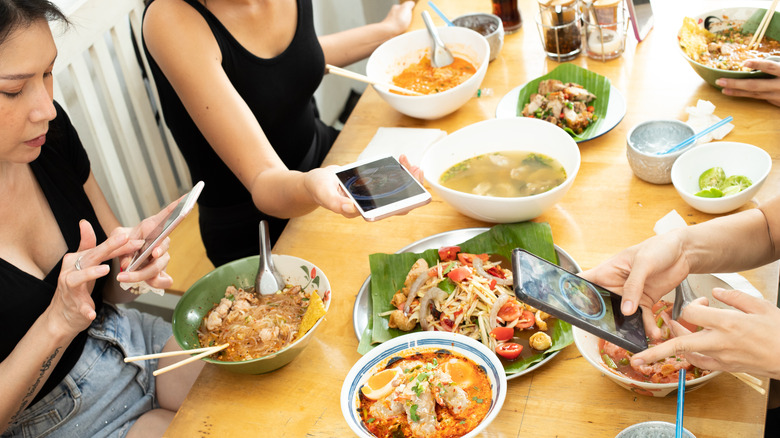The Unexpected Reason You Might End Up Eating More When Using Social Media
Do you find yourself eating more than usual when scrolling online? Are you constantly thinking about food for no obvious reason? Perhaps not surprisingly, this kind of behavior might have something to do with your social media habits. Facebook, Instagram, and other online platforms can alter food preferences and eating behavior, according to clinical research published in the journal Appetite. The internet is flooded with food photos, cooking videos, and recipes, leaving us craving for more.
"The problem with pictures is that the brain will also taste the food a little bit when it sees a picture," menu engineer Gregg Rapp told BBC Future. "Our minds find protein in motion — oozing cheese and dribbling yolk, very attractive," explained Charles Spence, a professor of experimental psychology. Rapp and Spence talked about digital menus and other marketing tactics used in the restaurant industry, but much of what they say applies to social media, too. Advertisers, food bloggers, and restaurant owners leverage social media to influence consumers' eating habits and drive sales. The latest food trends on TikTok and other platforms play a role, too.
People also tend to mimic others, suggests a 2021 study featured in PLoS One. This phenomenon is called "behavioral mimicry" and may explain why we eat more or less, or why we prefer some foods over others, depending on the social context. For example, you're more likely to start eating fast food if your friends on Facebook or Twitter are sharing photos of themselves eating pizza and fries.
Social media influences appetite and food choices
Social media affects your brain in more ways than you might think. A 2020 study shows that people are more likely to eat healthy foods or snack on junk food based on what they believe their social media peers would do, reports the journal Appetite. For example, subjects who thought their friends had a healthy diet reported eating more fruits and vegetables. The takeaway here is that social media influences eating behavior and food preferences, among other aspects.
Some groups are particularly vulnerable to this phenomenon. A 2021 review published in the Journal of Medical Internet Research says that social media usage can lead to healthier eating patterns, but it also promotes disordered eating in teenagers. The content posted on social networks may encourage anorexic behaviors, affect body image, and change how we think about food. "Peer group reinforcers may influence in both directions of the pendulum," explain the scientists.
On top of that, you're more likely to overeat if you keep scrolling through your newsfeed during meals. The same can happen when you eat while watching TV, explains Harvard Medical School. Over time, this habit can result in weight gain and harm your health. The food ads featured on social media may only make things worse. As it turns out, children exposed to online ads for junk food and soft drinks are more likely to end up overeating, according to 2016 findings published in the American Journal of Clinical Nutrition.
If you are struggling with an eating disorder, or know someone who is, help is available. Visit the National Eating Disorders Association website or contact NEDA's Live Helpline at 1-800-931-2237. You can also receive 24/7 Crisis Support via text (send NEDA to 741-741).


